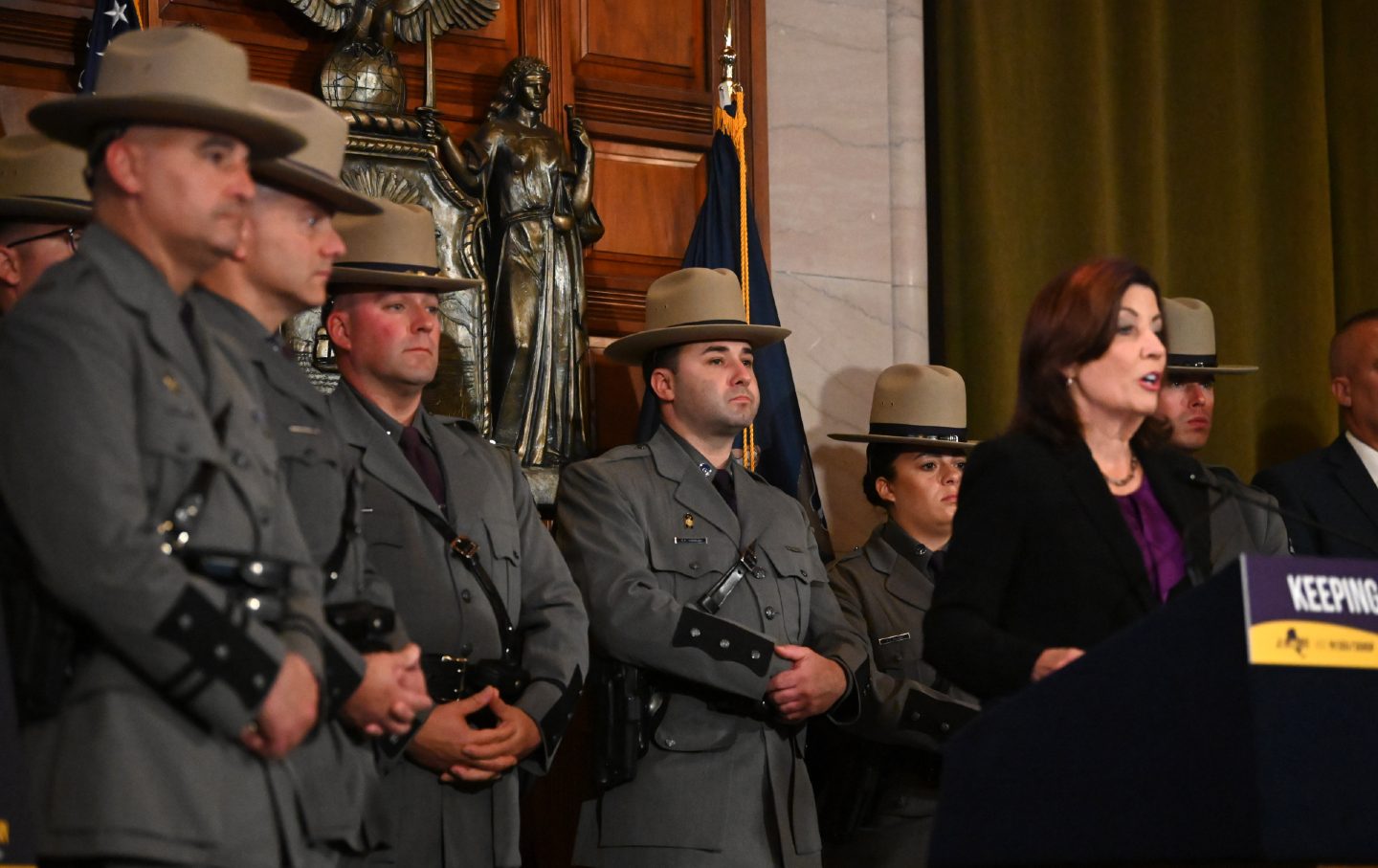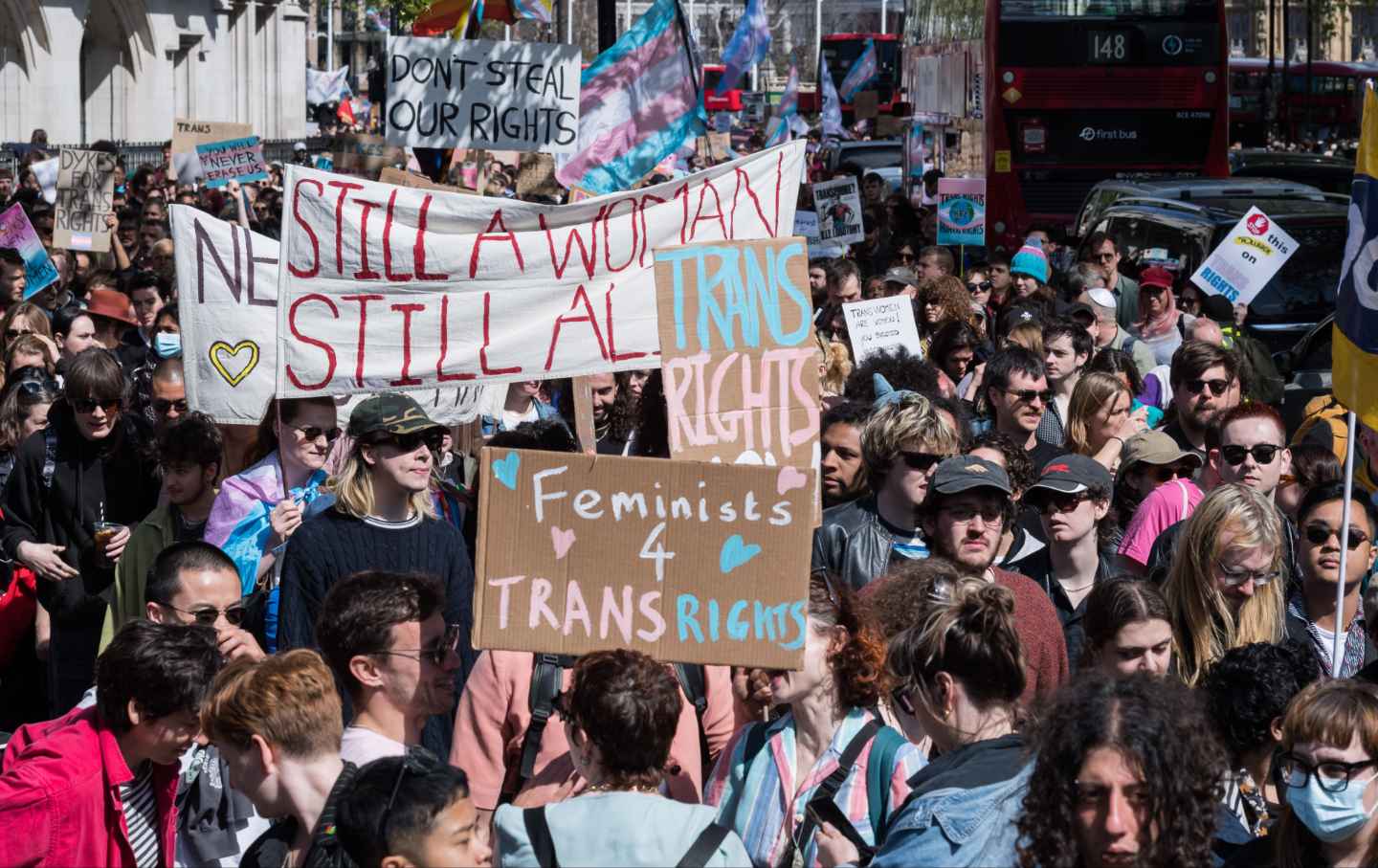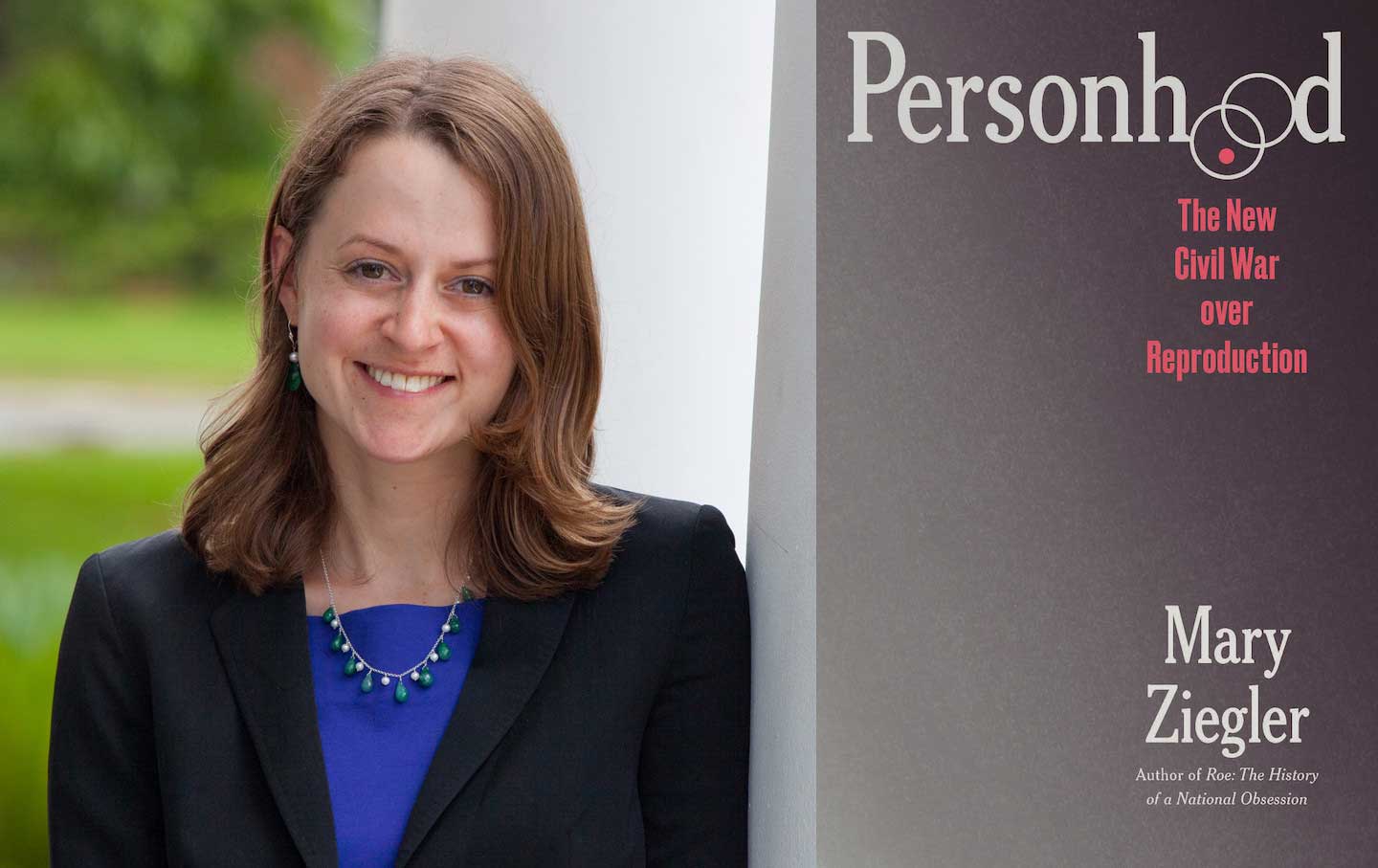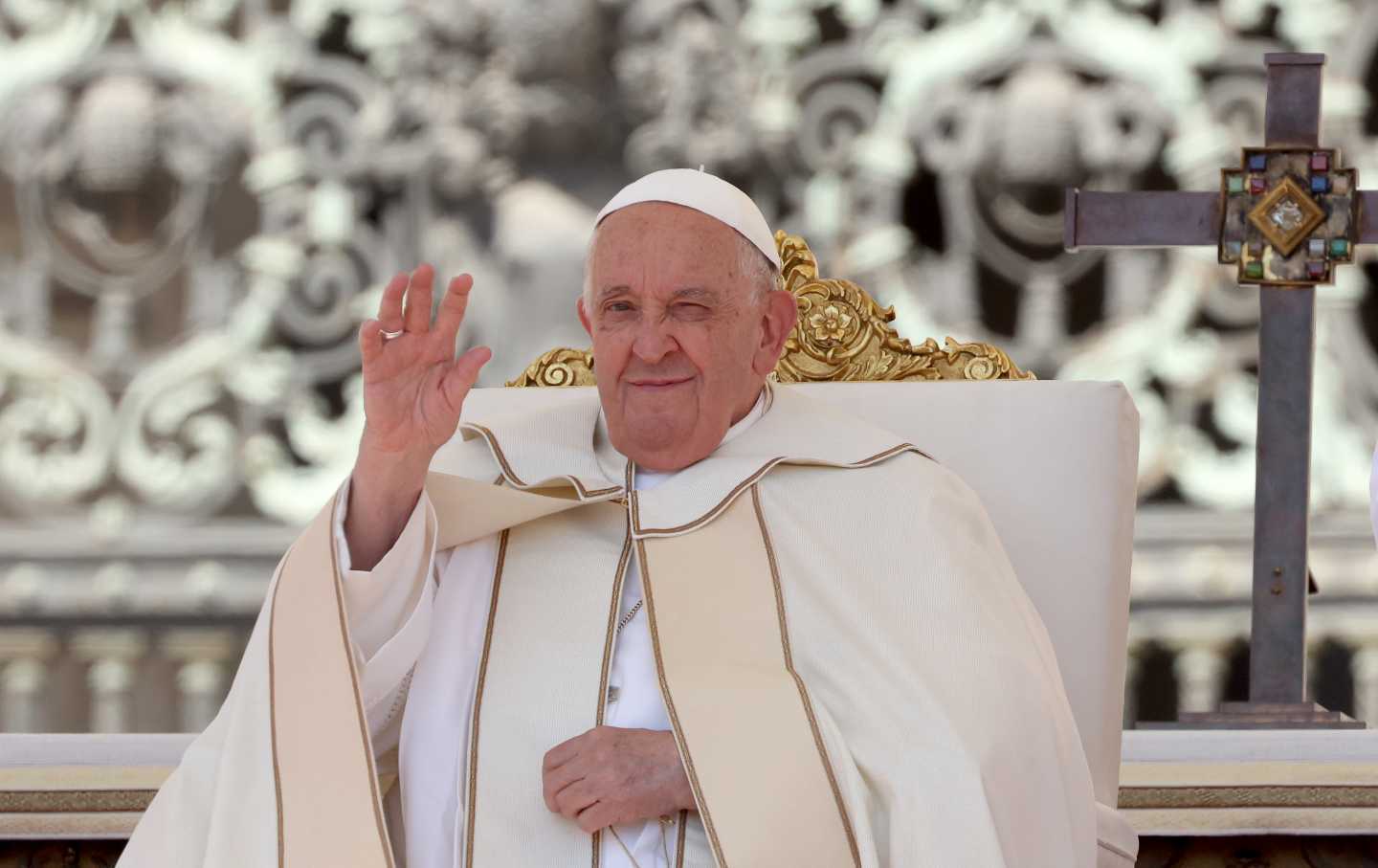Why the Establishment Loves Smearing Young People as Antisemites
Pundits and politicians are elevating blatantly dishonest polls to shore up an indefensible war.
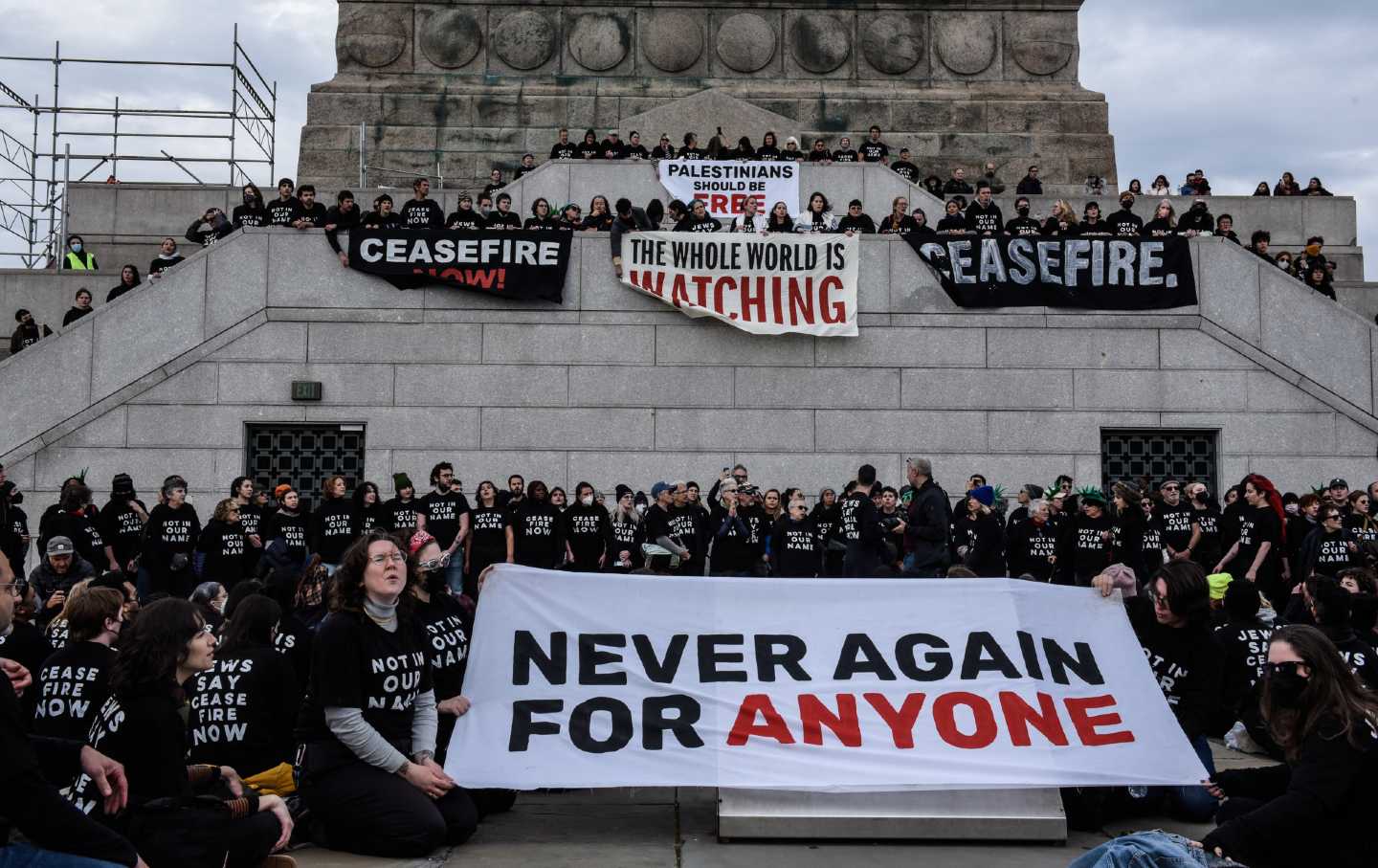
Wars, which are often launched by the old and fought by the young, have a way of opening up generation gaps. That was notably true of both the First World War and the American intervention in Vietnam, each of which produced a disillusioned cohort of youths that distrusted their elders: the “lost generation” of the 1920s and the New Left of the 1960s. This effect can even apply to countries where the fighting is witnessed only secondhand: Israel’s ferocious onslaught against the Palestinians, which erupted after the October 7 Hamas attack of last year and continues unabated, has widened the existing generation gap in the United States. In April, a Pew poll showed that 33 percent of Americans age 18 to 39 are more sympathetic to the Palestinians in the conflict, against 14 percent who are more sympathetic to Israelis. By contrast, among those over 65, only 9 percent are more sympathetic to Palestinians, while 47 percent are more sympathetic to Israelis.
This generation gap has led to a new wave of political mobilization on college campuses—but has also sparked an establishment backlash, with older politicians and pundits outdoing themselves in dumping on the young. On May 9, Hillary Clinton gave voice to the bitter scorn of many in her generation by smugly proclaiming on MSNBC, “I have had many conversations, as you have had, with a lot of young people over the last many months now. They don’t know very much at all about the history of the Middle East, or frankly about history in many areas of the world, including in our own country.”
Those who share Hillary Clinton’s establishment politics were strengthened in their conviction by two startling polls that appeared to show that young Americans were not just pro-Palestinians but also had a proclivity toward supporting Hamas and denying the Holocaust. Both polls were beset with methodological flaws that made them worthless as measures of public opinion, yet both were widely touted by right-wing and centrist pundits and politicians.
On December 7, 2023, The Economist summed up the finding of a poll it commissioned:
A new poll from YouGov/The Economist suggests that Yad Vashem has its work cut out. Young Americans—or at least the subset of them who take part in surveys—appear to be remarkably ignorant about one of modern history’s greatest crimes. Some 20% of respondents aged 18-29 think that the Holocaust is a myth, compared with 8% of those aged 30-44 (see chart). An additional 30% of young Americans said they do not know whether the Holocaust is a myth. Many respondents espouse the canard that Jews wield too much power in America: young people are nearly five times more likely to think this than are those aged 65 and older (28% versus 6%).
When weighing The Economist’s report, pay particular attention to its carefully hedged caveat, “at least the subset of them who take part in surveys.” This proviso in fact ends up destroying the whole poll.
A week after the Economist article, a polling outfit calling itself Harvard/Harris released a poll claiming that 51 percent of young people believe that the solution of the current conflict is “for Israel to be ended and given to Hamas and the Palestinians.” Harvard/Harris, despite its lofty Ivy League name, is in fact run by the infamous strategist Mark Penn. An erstwhile adviser to Bill and Hillary Clinton, Penn is notorious for his sleaziness and willingness to engage in racist attacks (as when he tried to make a campaign issue of Barack Obama’s youthful cocaine use). Penn is such a miscreant there have even been calls for his outfit to be ousted from his perch at Harvard, an institution (as the career of Jeffrey Epstein illustrates) not exactly notable for its moral delicacy.
It would be excessively kind to describe these polls as shoddy. They are, in fact, wildly dishonest. They both rely on the same flawed methodology of opt-in online sampling. In a thorough and devasting refutation of the Economist poll, the Pew Research Center noted that this method is “an approach where people are not selected randomly but are instead recruited from a variety of online sources like banner ads or social media.”
The problem with opt-in polling is that it is notoriously unreliable for young people and other groups (notably Hispanics), often producing results that are wildly at variance with traditional polling. These polls tend to produce “bogus” respondents, who simply answer questions arbitrarily and quickly in order to collect the rewards that are offered for participating in the survey. As an example, one opt-in survey seemed to show that 12 percent of adults under 30 and 24 percent of Hispanics claim they have a license to operate a nuclear submarine (in reality, the number of people who have this license is very close to 0 percent).
In the case of Holocaust denial, Pew conducted its own survey using where participants were “recruited by mail—rather than online—using probability-based sampling.” The results: “Rather than 20%, we found that 3% of adults under 30 agree with the statement ‘The Holocaust is a myth.’ (This percentage is the same for every other age group as well.)” In other words, only a very small minority of young Americans are Holocaust deniers—and there has been no growth of Holocaust denial among the young compared to earlier generations. The entire Economist report was a fabrication. (To its credit, The Economist updated its story with an acknowledgement of Pew’s critique, although the magazine fell short of the complete disavowal of the original article it should have offered).
On May 31, the San Francisco Chronicle published a debunking of the Harvard/Harris poll that built on the Pew critique. Aside from the already noted problems with opt-in sampling, the newspaper noted:
Respondents in online opt-in panels are particularly prone to speed through survey questions rather than reading carefully and generating thoughtful answers. About 1 in 5 of Harvard-Harris’ respondents, and half of its 18-to-24-year-old sample, completed the survey’s more than 200 complex questions, some over 50 words in length, in under 15 minutes. On average, respondents answered each question in about four seconds—much faster than the rate at which adults read nonfiction texts.
We can therefore conclude that the participants of the Harvard/Harris poll probably weren’t reading the questions with care, and were often just racing to finish the exercise.
Yet these polls were notable not only for their fraudulent results but also for the extreme credulity with which they were treated by respectable politicians and pontificators.
Former New York mayor Michael Bloomberg tweeted, “79 years after Auschwitz-Birkenau was liberated, a poll found that 1 in 5 young Americans believe the Holocaust is a myth – & half think it may be.” Representative Dean Phillips echoed this thought. Atlantic writer Conor Friedersdorf tweeted, “WTF 18 to 29 year olds? When you add ‘neither agree nor disagree’ that’s fully *half* that fails to reject the despicable and idiotic claim that *the Holocaust is a myth.*” None of these avatars of establishment wisdom bothered to ask themselves if it is even plausible that roughly half of young adults in America would in fact be open Holocaust deniers.
Similarly with the Harris/Harvard poll, simpleminded gullibility was on ample display. The poll show that 67 percent of Americans age 18–24 believe that Jews as a class are “oppressors.” William Saletan of The Bulwark, an organ of Never Trump conservatism, claimed that the poll’s finding was “consistent with other polls that have found relatively high anti-Jewish sentiment among young American adults.” Cathy Young, a libertarian who also writes for The Bulwark, responded to this poll by writing, “Yeah, next time someone tells me that I need to stop being a grumpy old person and cheer for the wonderfulness of the social-justiced ‘kids,’ I’ll just point to this and say no, fuck the little shits.”
Liberal pundit Michael A. Cohen (who likes to remind the world he is not, despite his name, the former lawyer for Donald Trump), chimed in by saying, “The Harris poll is generally not good … but this is a terrifying result … and I imagine is directly related to dipshits who keep accusing Israel of genocide.” With the liberal Michael Cohen writing tweets this ridiculous (there are many others of the same caliber), perhaps the felon Michael Cohen should be the one trying to distinguish his good name from his embarrassing doppelgänger.
Popular
“swipe left below to view more authors”Swipe →The comments by Young and Cohen are especially revealing. While some promoting the junk polls are silent on the Gaza slaughter, others are enthusiastic advocates for Israeli militarism. Such writers and politicians are well aware that what Israel is doing to the Palestinians is indefensible. So they eagerly embrace any argument they can to discredit the young people who are leading a mass movement on behalf of Palestinian rights. If the weapon to hand is dishonest polling that smears the younger generation as Hamas-loving Holocaust deniers, then that is the blunt instrument they will use.
Pollster Evan Roth Smith of Blueprint, an outfit that provides opinion data to Democrats, distilled recent findings by saying, “Young voters do not look at our politics and see any good guys. They see a dying empire led by bad people.” As my colleague Chris Lehmann noted, young people think this way because they are paying attention. One could add that the people who are the mouthpieces of the dying empire are becoming ever more stridently dishonest.
Hold the powerful to account by supporting The Nation
The chaos and cruelty of the Trump administration reaches new lows each week.
Trump’s catastrophic “Liberation Day” has wreaked havoc on the world economy and set up yet another constitutional crisis at home. Plainclothes officers continue to abduct university students off the streets. So-called “enemy aliens” are flown abroad to a mega prison against the orders of the courts. And Signalgate promises to be the first of many incompetence scandals that expose the brutal violence at the core of the American empire.
At a time when elite universities, powerful law firms, and influential media outlets are capitulating to Trump’s intimidation, The Nation is more determined than ever before to hold the powerful to account.
In just the last month, we’ve published reporting on how Trump outsources his mass deportation agenda to other countries, exposed the administration’s appeal to obscure laws to carry out its repressive agenda, and amplified the voices of brave student activists targeted by universities.
We also continue to tell the stories of those who fight back against Trump and Musk, whether on the streets in growing protest movements, in town halls across the country, or in critical state elections—like Wisconsin’s recent state Supreme Court race—that provide a model for resisting Trumpism and prove that Musk can’t buy our democracy.
This is the journalism that matters in 2025. But we can’t do this without you. As a reader-supported publication, we rely on the support of generous donors. Please, help make our essential independent journalism possible with a donation today.
In solidarity,
The Editors
The Nation



